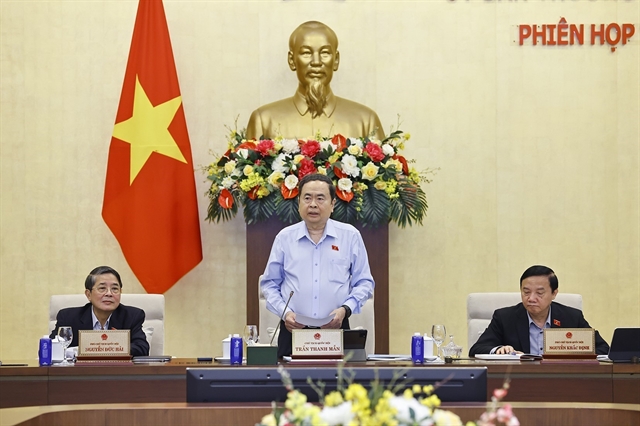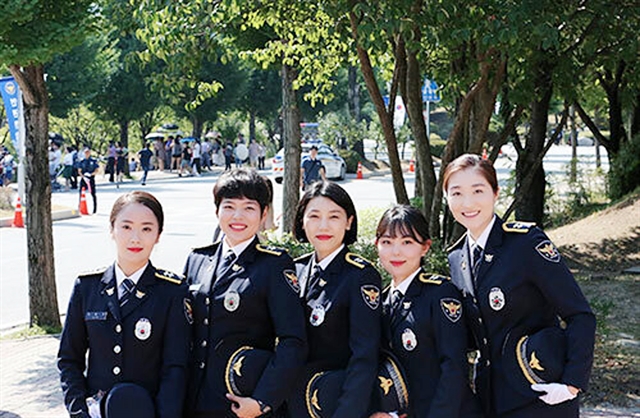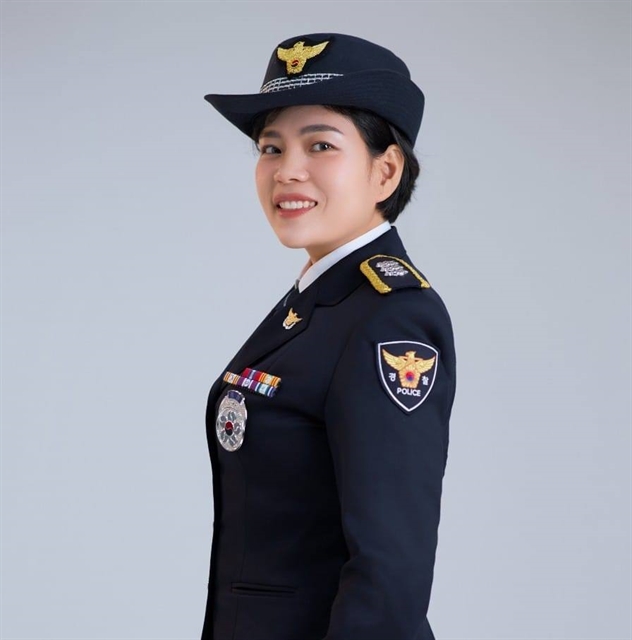 Society
Society

"Since I was a child, I had nurtured the dream of becoming a female police officer. While my peers were reading publications about students I often read Công An Nhân Dân (People's Public Security) newspaper. I was captivated by the thrilling and fascinating criminal cases solved by the police officers," Minh told Dân Trí (Intellectual) online newspaper.

|
| Nguyễn Hồng Minh, second from left, and her Korean colleagues. Photo courtesy of Hồng Minh |
HÀ NỘI The dream of becoming a female police officer has become a reality for Nguyễn Hồng Minh, a Vietnamese bride in South Korea. The 38-year-old policewoman is currently working at the Jangseong County Police Department, South Jeolla Province, South Korea.
Compared to many people of her age, Minh's journey started relatively late, but it's the path she took to fulfill the dreams of a Vietnamese bride in South Korea.
Minh was born and raised in Vinh City, Nghệ An central province.
In 2005, she left her hometown and went to South Korea to study economics at Chosun University in Gwangju metropolitan city.
Driven by her deep affection for a local man, she decided to stay in South Korea and work for a trading company.
A year later, they got married.
After giving birth to their third child, Minh took a temporary break from work to focus on her family and her baby.
During this time, she decided to try her luck by taking the police recruitment exam.
"Since I was a child, I had nurtured the dream of becoming a female police officer. While my peers were reading publications about students I often read Công An Nhân Dân (People's Public Security) newspaper. I was captivated by the thrilling and fascinating criminal cases solved by the police officers," Minh told Dân Trí (Intellectual) online newspaper.
"However, my father didn't share the same view. He thought this profession was too dangerous and demanding for a woman, and that's why he initially guided me toward a career in economics."
When she informed her husband and family about her decision to register for the South Korean police entrance exam, Minh initially thought that they would object because she already had three young children to take care of.
Moreover, this was considered a harsh examination that demanded high proficiency in both professional skills and physical fitness.
Contrary to her expectations, her family all expressed their wholehearted support for Minh's plan to become a police officer.
"My father told me that becoming a police officer in our home country is not easy, but becoming a police officer in Korea is very difficult. The work is hard and dangerous."
"But they still supported me to help my dream come true."
"Live your dream. It is never too late to turn a dream into reality," Minh's father told her.
With the support and encouragement of her loved ones, Minh plunged into her preparations. While the professional knowledge posed its difficulties, it was the physical fitness aspect of the examination that truly challenged her as she weighed up to 100kg at that time.

|
| Female police officer Nguyễn Hồng Minh. Photo courtesy of Hồng Minh |
Her regime of weight loss exercises, strength training and martial arts became more and more intense. Sometimes Minh thought she couldn't continue, but then the woman of three children rallied her spirit with a 200 per cent commitment, because she was very close to making her dream a reality.
All her efforts finally paid off. Minh lost 40kg in 10 months and passed the Korean police entrance exams in 2018 excellently.
After undergoing six months of training and an additional two months of internships, she was officially appointed to work at the Jangseong County Police Department.
She was assigned to investigate cases of domestic violence, school violence and missing persons.
In the beginning, while handling cases of domestic violence, Minh received numerous requests for assistance from fellow Vietnamese brides.
Particularly, at the beginning of 2022, the South Korean police established a Facebook page to help share information quickly and promptly with the Vietnamese community in South Korea.
The Facebook page now has 97,000 followers, and through Vietnamese-language livestreams, it has played a role in disseminating the policies of the South Korean Ministry of Justice for the Vietnamese community in South Korea.
She recalled a story about a Vietnamese bride who was abused by her husband for many years. Through a message left on the Facebook page, Minh asked for the woman's phone number to directly chat and share advice.
"The lady had endured her husband's abuse for many years but was too afraid to report it to the police, fearing her husband's retaliation. She asked me to help her escape from her husband's violence. And I guided her through the procedures for reporting to the competent agency," Minh said.
The woman was transferred to a centre for victims of domestic violence and received legal advice to pursue a divorce from her husband.
"It's great that she finally found the courage to stand up for herself to have a happier life."
Minh said that conflicts and disagreements that arise in multicultural families stem from differences in language, culture and lifestyle.
In addition to resolving cases in accordance with local laws, Minh spends a lot of time consulting and supporting Vietnamese brides.
"Before deciding to marry a foreign spouse, Vietnamese women need to equip themselves with the language and an understanding of the local culture to have a basic foundation for married life. In addition, Vietnamese brides, and foreign brides in general, should have legal knowledge and be brave in seeking support, rather than silently enduring their circumstances."
Furthermore, Minh has persuaded many Vietnamese brides to join the volunteer team ensuring security and order, helping them enhance their legal knowledge and gain more confidence when participating in activities to maintain security and order in their local communities.
An ongoing issue in South Jeolla Province and many other regions of South Korea is the situation of foreign workers who stay illegally after their work contracts expire. Through Facebook, Minh provides these workers with a clear understanding of South Korean regulations.
"Illegal workers in South Korea are not entitled to any benefits; they don't have insurance and will have to pay 100 per cent of the treatment costs if they get sick, which can be very expensive. Undocumented residents cannot open bank accounts, so when sending money back to Việt Nam, they have to go through a third party and face significant risk of being scammed," Minh said.
Being fluent in three languages including Korean, English and Vietnamese gives her many advantages in performing her duties.
She has undertaken special assignments such as escorting, interpreting, and ensuring the safety of the Commander of the South Korean National Police Agency during visits to Việt Nam, as well as receiving, escorting, and interpreting for the deputy minister and delegates from the Vietnamese Ministry of Public Security during their visits in South Korea.
According to the female police officer of Vietnamese origin, this is a very stressful task, requiring the interpreter to learn about and prepare carefully for the content of the work, particularly specialised terms. However, those special business trips also left her with many beautiful memories.
"When I escorted high-ranking leaders to Việt Nam, many Vietnamese people asked me, 'You are a foreigner, Why do you speak Vietnamese so well?' And they were quite surprised as I told them I'm Vietnamese."
"In my role as a Korean police officer of Vietnamese origin, I take pride in contributing a small brick to build bridges and nurture the close and friendly relationship between the Vietnamese Ministry of Public Security and the South Korean National Police Agency," Minh said.
Working as a police officer has also meant that the mother of three sacrifices time spent on herself and her family. It is not rare that she comes home after midnight and leaves early the next morning to a crime scene.
Being able to do the work she loves brings happiness to her, and within that happiness, she is grateful for her family's understanding and support, as well as assistance from her colleagues.
After work trips, work in the office, and housework, Minh dedicates her weekends to teaching the Vietnamese language to children with Vietnamese mothers.
Through these lessons, she not only helps these children communicate with their mothers and grandparents in Việt Nam, but also helps them better understand the traditions, history and culture of their homeland.
At home, she maintains teaching and communicating in Vietnamese with her own children.
Every year, she and her husband take their children to visit their grandparents in Việt Nam, so they can understand and love their homeland more.
"Becoming a police officer, my goal is to assist the foreign community living in South Korea, preventing criminal situations caused by a lack of information." — VNS




